Sen. Kennedy's Life and Legacy
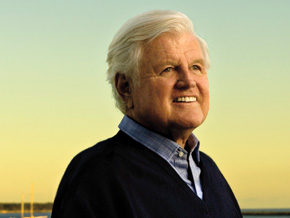
Photo: Denis Reggie
His famous family knew him as the last brother, the cherished uncle and the patriarch. His countrymen remember him as the Lion of the Senate.
Born in Boston in 1932, Edward Moore Kennedy was the youngest of Rose and Joseph Kennedy's nine children. Ted, as he was called, grew up idolizing his older siblings, especially his brothers, Joe, John and Bobby.
Though the Kennedy family was blessed with money and privilege, they were also cursed by unimaginable tragedy. In 1944, Joe, the eldest sibling, died in World War II. Four years later, the fourth child, Kathleen, died in a plane crash.
In the '60s, the family lost two more loved ones before their time. In 1963, John F. Kennedy Jr., America's 35th president, was assassinated in Dallas. His younger brother, Bobby, met the same fate in 1968.
After Bobby's assassination, the youngest Kennedy, a Massachusetts senator, stepped forward. He quickly became the one everyone leaned on in times of tragedy. "Like my brothers before me, I pick up the fallen standard," he said. "Sustained by their memory of our priceless years together, I shall try to carry forward that special commitment to justice, to excellence, to courage that distinguished their lives."
And that's exactly what he did. For 46 years, Sen. Edward M. Kennedy served his country in the U.S. Senate and championed causes like civil rights, education and health insurance.
Then, on August 25, 2009, long after America laid his brothers to rest, Sen. Kennedy lost his battle with brain cancer. This public figure died privately at his home in Hyannisport, Massachusetts, surrounded by his children, grandchildren and wife of 17 years, Vicki Kennedy.
For the first time on television, Vicki speaks publicly about the last 15 months of her husband's life, a time marked by much joy, laughter and sorrow.
Born in Boston in 1932, Edward Moore Kennedy was the youngest of Rose and Joseph Kennedy's nine children. Ted, as he was called, grew up idolizing his older siblings, especially his brothers, Joe, John and Bobby.
Though the Kennedy family was blessed with money and privilege, they were also cursed by unimaginable tragedy. In 1944, Joe, the eldest sibling, died in World War II. Four years later, the fourth child, Kathleen, died in a plane crash.
In the '60s, the family lost two more loved ones before their time. In 1963, John F. Kennedy Jr., America's 35th president, was assassinated in Dallas. His younger brother, Bobby, met the same fate in 1968.
After Bobby's assassination, the youngest Kennedy, a Massachusetts senator, stepped forward. He quickly became the one everyone leaned on in times of tragedy. "Like my brothers before me, I pick up the fallen standard," he said. "Sustained by their memory of our priceless years together, I shall try to carry forward that special commitment to justice, to excellence, to courage that distinguished their lives."
And that's exactly what he did. For 46 years, Sen. Edward M. Kennedy served his country in the U.S. Senate and championed causes like civil rights, education and health insurance.
Then, on August 25, 2009, long after America laid his brothers to rest, Sen. Kennedy lost his battle with brain cancer. This public figure died privately at his home in Hyannisport, Massachusetts, surrounded by his children, grandchildren and wife of 17 years, Vicki Kennedy.
For the first time on television, Vicki speaks publicly about the last 15 months of her husband's life, a time marked by much joy, laughter and sorrow.
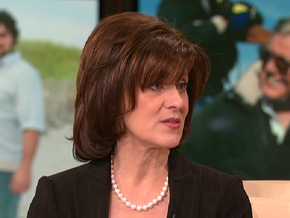
Looking back, Vicki says 2008 began with excitement and promise. That January, Sen. Kennedy took the stage with his niece Caroline and publicly endorsed Democratic candidate Barack Obama for president. "I'm proud to stand here with him today and offer my help, offer my voice, offer my energy, my commitment to make Barack Obama the next president of the United States," he said.
Then, as primary season came to a close, Sen. Kennedy suffered a seizure at his Cape Cod home. Vicki says that day was supposed to be the start of sailing season, but instead it marked the beginning of the end.
"We woke up as usual, went downstairs to have coffee. He took the dogs out for their first walk, as usual, and read the newspapers," Vicki says. "Then, he was taking the dogs out again, and suddenly I heard Judy, a wonderful friend of ours who's been with us at the Cape for a long time. She said, "Vicki! Vicki!" And I ran into the dining room, and Teddy was sitting in a chair there. I knew something very grave was happening."
Sen. Kennedy was rushed to the hospital, and after a barrage of tests, Vicki says doctors gave them the grim diagnosis. There was a cancerous tumor in his brain, and Vicki says doctors told Sen. Kennedy he had a few months to live.
"He was given a very, very short period of time, and he just didn't accept that," she says. "Two to four months one doctor said, but it just didn't compute with him."
Then, as primary season came to a close, Sen. Kennedy suffered a seizure at his Cape Cod home. Vicki says that day was supposed to be the start of sailing season, but instead it marked the beginning of the end.
"We woke up as usual, went downstairs to have coffee. He took the dogs out for their first walk, as usual, and read the newspapers," Vicki says. "Then, he was taking the dogs out again, and suddenly I heard Judy, a wonderful friend of ours who's been with us at the Cape for a long time. She said, "Vicki! Vicki!" And I ran into the dining room, and Teddy was sitting in a chair there. I knew something very grave was happening."
Sen. Kennedy was rushed to the hospital, and after a barrage of tests, Vicki says doctors gave them the grim diagnosis. There was a cancerous tumor in his brain, and Vicki says doctors told Sen. Kennedy he had a few months to live.
"He was given a very, very short period of time, and he just didn't accept that," she says. "Two to four months one doctor said, but it just didn't compute with him."

Sen. Kennedy knew he was in for the fight of his life, but duty called. One month after undergoing brain surgery, he returned to Capitol Hill to cast a crucial tie-breaking vote on a Medicare bill.
Then, in August 2008, he made a surprise appearance at the Democratic National Convention and voiced his continued support of Barack Obama, who went on to win the 2008 election.
Sen. Kennedy also pledged to be in Washington, D.C., on inauguration day, and on the morning of January 20, 2009, he sat nearby as President Obama took the oath of office. Only those closest to the senator knew what he went through to make good on this promise.
"He was exercising every single day to be strong enough to be there," Vicki says. "He was absolutely determined, and it was with great joy."
Despite setbacks and more seizures, Sen. Kennedy pushed on. He continued to sail the seas on his beloved boat, Mya, and even celebrated his 77th birthday with a star-studded bash.
But, most days, he devoted hours to his autobiography, True Compass, a book he worked on for the last five years of his life.
Then, in August 2008, he made a surprise appearance at the Democratic National Convention and voiced his continued support of Barack Obama, who went on to win the 2008 election.
Sen. Kennedy also pledged to be in Washington, D.C., on inauguration day, and on the morning of January 20, 2009, he sat nearby as President Obama took the oath of office. Only those closest to the senator knew what he went through to make good on this promise.
"He was exercising every single day to be strong enough to be there," Vicki says. "He was absolutely determined, and it was with great joy."
Despite setbacks and more seizures, Sen. Kennedy pushed on. He continued to sail the seas on his beloved boat, Mya, and even celebrated his 77th birthday with a star-studded bash.
But, most days, he devoted hours to his autobiography, True Compass, a book he worked on for the last five years of his life.
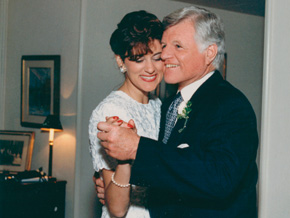
While writing True Compass, Sen. Kennedy used 50 years of notes—some written and some dictated—to document his personal and political journey. In Chapter 21, "The Woman Who Changed My Life," he wrote about the moment he fell for Vicki, a longtime family friend, Kennedy supporter and divorced mom of two.
"There came a point in my own life when I had to admit that I'd stopped looking forward to things," he wrote. "All of this began to change when I rang the doorbell of the home in northwest D.C. where I had been invited to dinner on the evening of June 17, 1991, and found myself looking into the beautiful hazel eyes of Victoria Reggie."
During their old-fashioned courtship, Vicki says Sen. Kennedy, a divorced father of three, came over every night for dinner and became a fixture in her home. He also showered her with notes and flowers. "It was really sweet," she says.
Sen. Kennedy proposed to Vicki at the New York's Metropolitan Opera, and they married in 1992. From that day forward, Vicki was by his side…even on his last day.
"It was just really an incredible journey to be on with this man I absolutely adored," she says, "And [it was] an inspiration to watch how Teddy grappled with such a grave diagnosis but always looked forward with hope."
"There came a point in my own life when I had to admit that I'd stopped looking forward to things," he wrote. "All of this began to change when I rang the doorbell of the home in northwest D.C. where I had been invited to dinner on the evening of June 17, 1991, and found myself looking into the beautiful hazel eyes of Victoria Reggie."
During their old-fashioned courtship, Vicki says Sen. Kennedy, a divorced father of three, came over every night for dinner and became a fixture in her home. He also showered her with notes and flowers. "It was really sweet," she says.
Sen. Kennedy proposed to Vicki at the New York's Metropolitan Opera, and they married in 1992. From that day forward, Vicki was by his side…even on his last day.
"It was just really an incredible journey to be on with this man I absolutely adored," she says, "And [it was] an inspiration to watch how Teddy grappled with such a grave diagnosis but always looked forward with hope."
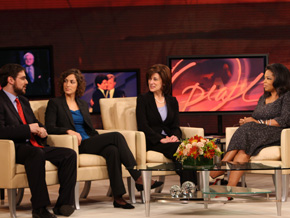
Vicki's children, Curran and Caroline, both say they had a special relationship with their stepfather from the moment he entered their lives. "I was this little shy 5-year-old, and I didn't quite know what to make of this man who, as mom said, came to dinner every night and was this amazing presence," Caroline says. "He just really made an effort to connect individually with me."
Curran, who was 8 years old when he met Sen. Kennedy, says his stepfather played more than just a parental role. "In addition to being this father figure that was always there and always so supportive, he was just such a great friend," Curran says. "He and I shared a love of sports, which he kind of spent a lot of time to get to know well to have that bond with me."
Sen. Kennedy took his role in Vicki's children's lives very seriously, she says. "It was such a surprise to me when we were still dating he said, 'Well, it's Halloween. I'll be there to take the children trick-or-treating,'" she says. "My neighbors were in shock. It was the talk of my street."
Those were the moments that made Sen. Kennedy the man he was, Vicki says. "He loved those kid things so much," she says. "I think his life was defined by family."
Curran, who was 8 years old when he met Sen. Kennedy, says his stepfather played more than just a parental role. "In addition to being this father figure that was always there and always so supportive, he was just such a great friend," Curran says. "He and I shared a love of sports, which he kind of spent a lot of time to get to know well to have that bond with me."
Sen. Kennedy took his role in Vicki's children's lives very seriously, she says. "It was such a surprise to me when we were still dating he said, 'Well, it's Halloween. I'll be there to take the children trick-or-treating,'" she says. "My neighbors were in shock. It was the talk of my street."
Those were the moments that made Sen. Kennedy the man he was, Vicki says. "He loved those kid things so much," she says. "I think his life was defined by family."

Photo: AP
Sen. Kennedy's memoir is a vivid recollection of his entire life, from family triumphs and tragedies to controversies.
One of the most public controversies of Sen. Kennedy's life took place in 1969, when he drove a car off a narrow bridge on Martha's Vineyard, Massachusetts.
Sen. Kennedy survived the accident, but Mary Jo Kopechne, Bobby Kennedy's former secretary, drowned. According to police, it took the senator eight hours to report what happened.
Kennedy eventually pled guilty to leaving the scene of an accident. In the book, Sen. Kennedy reflected on the incident and wrote, "That night on Chappaquiddick Island ended in a horrible tragedy that haunts me every day of my life."
One of the most public controversies of Sen. Kennedy's life took place in 1969, when he drove a car off a narrow bridge on Martha's Vineyard, Massachusetts.
Sen. Kennedy survived the accident, but Mary Jo Kopechne, Bobby Kennedy's former secretary, drowned. According to police, it took the senator eight hours to report what happened.
Kennedy eventually pled guilty to leaving the scene of an accident. In the book, Sen. Kennedy reflected on the incident and wrote, "That night on Chappaquiddick Island ended in a horrible tragedy that haunts me every day of my life."
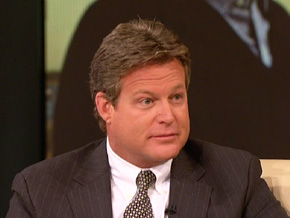
In 1970, one year after the fatal car accident in Martha's Vineyard, Sen. Kennedy was re-elected to the Senate. Nine years later, he announced that he would run for president, but he lost the 1980 democratic nomination to Jimmy Carter.
In 1984, Sen. Kennedy considered running for president again, but he eventually decided against it.
Sen. Kennedy's oldest son, Ted Kennedy Jr., says this was the greatest decision his father ever made. "He'd pursued the presidency once. He didn't need to do that again," Ted says. "I think he's shown that there's no other person who's been able to achieve the kind of legislative success that he was able to achieve by sticking and persevering in the United States Senate."
In 1984, Sen. Kennedy considered running for president again, but he eventually decided against it.
Sen. Kennedy's oldest son, Ted Kennedy Jr., says this was the greatest decision his father ever made. "He'd pursued the presidency once. He didn't need to do that again," Ted says. "I think he's shown that there's no other person who's been able to achieve the kind of legislative success that he was able to achieve by sticking and persevering in the United States Senate."
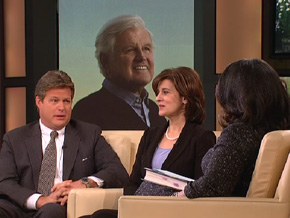
While there was much publicity surrounding his political career, Sen. Kennedy's personal life also spent plenty of time in the spotlight. In 1981, a year after his presidential campaign, Sen. Kennedy and his wife of 23 years, Joan, filed for divorce.
Years later, another family tragedy put the Kennedys in the news. Sen. Kennedy's nephew, John F. Kennedy Jr., was piloting a flight from Essex County Airport in New Jersey to Martha's Vineyard Airport when the plane crashed into the Atlantic Ocean. John died in the crash, as did his wife, Carolyn Bessette Kennedy, and his sister-in-law, Lauren Bessette.
Ted says his father always took the helm in times of family crisis.
"The fact that he was there to take care of everything was an incredible relief to us," Ted says. "He instantly took on the situation, whatever it was. Whether it was John's death or whatever situation was facing our family, he was in the director's chair and he really helped all of us emotionally and logistically."
Years later, another family tragedy put the Kennedys in the news. Sen. Kennedy's nephew, John F. Kennedy Jr., was piloting a flight from Essex County Airport in New Jersey to Martha's Vineyard Airport when the plane crashed into the Atlantic Ocean. John died in the crash, as did his wife, Carolyn Bessette Kennedy, and his sister-in-law, Lauren Bessette.
Ted says his father always took the helm in times of family crisis.
"The fact that he was there to take care of everything was an incredible relief to us," Ted says. "He instantly took on the situation, whatever it was. Whether it was John's death or whatever situation was facing our family, he was in the director's chair and he really helped all of us emotionally and logistically."
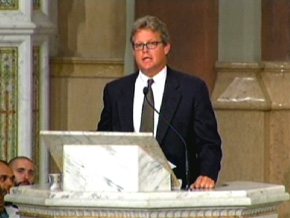
Photo: ABC News
On August 25, Sen. Kennedy lost his yearlong battle with brain cancer. At his funeral in Boston, generations of Kennedys gathered to say goodbye to the devoted father and stepfather, surrogate father to the children of his fallen brothers and grandpa to four.
During his funeral, Ted beautifully honored his father with a story about triumphing over adversity. "When I was 12 years old, I was diagnosed with bone cancer, and a few months after I lost my leg there was a heavy snowfall over my childhood home outside of Washington, D.C, and my father went to the garage to get the old flexible flyer and asked me if I wanted to go sledding down the steep driveway," Ted said in his eulogy. "I was trying to get used to my new artificial leg and the hill was covered with ice and snow and it wasn't easy for me to walk, and the hill was very slick. And as I struggled to walk, I slipped and I fell on the ice and I started to cry. I said, 'I can't do this.' I said, 'I'll never be able to climb up that hill.' And he lifted me up in his strong, gentle arms and said something I will never forget. He said: 'I know you can do it. There's nothing that you can't do. We're going to climb that hill together, even if it takes us all day.' Sure enough, he held me around my waist and we slowly made it to the top."
In True Compass, Sen. Kennedy writes that telling Ted about his bone cancer was one of the most difficult moments in his life, but Ted says his father never let him see that pain.
"He had to be so strong because with everything that happened with [John's] death and Bobby's death and with the challenges that I faced in my life, I think he felt like he really needed to be there for all of us," Ted says. "I think he felt like if he showed a lot of vulnerability, he might be swallowed up by it."
During his funeral, Ted beautifully honored his father with a story about triumphing over adversity. "When I was 12 years old, I was diagnosed with bone cancer, and a few months after I lost my leg there was a heavy snowfall over my childhood home outside of Washington, D.C, and my father went to the garage to get the old flexible flyer and asked me if I wanted to go sledding down the steep driveway," Ted said in his eulogy. "I was trying to get used to my new artificial leg and the hill was covered with ice and snow and it wasn't easy for me to walk, and the hill was very slick. And as I struggled to walk, I slipped and I fell on the ice and I started to cry. I said, 'I can't do this.' I said, 'I'll never be able to climb up that hill.' And he lifted me up in his strong, gentle arms and said something I will never forget. He said: 'I know you can do it. There's nothing that you can't do. We're going to climb that hill together, even if it takes us all day.' Sure enough, he held me around my waist and we slowly made it to the top."
In True Compass, Sen. Kennedy writes that telling Ted about his bone cancer was one of the most difficult moments in his life, but Ted says his father never let him see that pain.
"He had to be so strong because with everything that happened with [John's] death and Bobby's death and with the challenges that I faced in my life, I think he felt like he really needed to be there for all of us," Ted says. "I think he felt like if he showed a lot of vulnerability, he might be swallowed up by it."
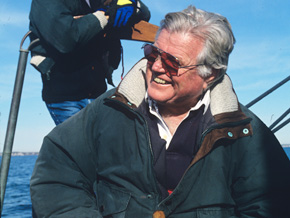
Sen. Kennedy sent a letter to the Pope a few months before his death. "I know that I've been an imperfect human being," he wrote. "But with the help of my faith, I have tried to right my path."
Ted says his father's faith was a guiding principle in his life. "[That] comes out in the book, because he didn't really talk about his religion or his faith. But it is what sustained him," he says. "If you read the letter [to the Pope], you'll see the humility and faith that my father really had."
Vicki says Sen. Kennedy's was a case of actions speaking louder than words. "He didn't talk about [faith] in a preachy way," she says. "But he lived it, demonstrated it."
Sen. Kennedy's legacy is one that will be remembered for a long time, Ted says. "I teach my children that they have a lot to be proud of, but it doesn't mean that the Kennedys are any better or any less than anybody else. My father was certainly a great guy and an incredible human being, but it was what he stood for and what my uncle stood for that is the reason we're still talking about them today," Ted says. "Those things will endure forever."
Ted says his father's faith was a guiding principle in his life. "[That] comes out in the book, because he didn't really talk about his religion or his faith. But it is what sustained him," he says. "If you read the letter [to the Pope], you'll see the humility and faith that my father really had."
Vicki says Sen. Kennedy's was a case of actions speaking louder than words. "He didn't talk about [faith] in a preachy way," she says. "But he lived it, demonstrated it."
Sen. Kennedy's legacy is one that will be remembered for a long time, Ted says. "I teach my children that they have a lot to be proud of, but it doesn't mean that the Kennedys are any better or any less than anybody else. My father was certainly a great guy and an incredible human being, but it was what he stood for and what my uncle stood for that is the reason we're still talking about them today," Ted says. "Those things will endure forever."
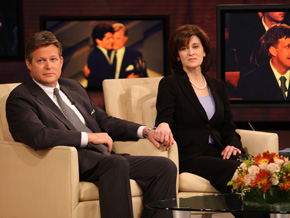
Vicki says she still feels the acute loss of her husband but is getting by thanks to the love of family and the knowledge that nothing was left unsaid. "The greatest comfort that I have is that we had those 15 months. We said everything," she says.
As to questions about whether she will run for senate herself, Vicki says it's not in the cards. "We had Sen. Kennedy in our household," she says. "Not for me."
Ted says that he, too, is grateful for the final days he got to share with his father. "I think he gave me all the tools I need to be a successful person."
In some of Sen. Kennedy's final thoughts in True Compass, his message speaks strongly to his own life of service and the American legacy he left behind. "Together we have known success and seen setbacks. Victory and defeat," he writes. "But we have never lost our belief that we are all called to a better country and a newer world. The work begins anew. The hope rises again. And the dream lives on."
As to questions about whether she will run for senate herself, Vicki says it's not in the cards. "We had Sen. Kennedy in our household," she says. "Not for me."
Ted says that he, too, is grateful for the final days he got to share with his father. "I think he gave me all the tools I need to be a successful person."
In some of Sen. Kennedy's final thoughts in True Compass, his message speaks strongly to his own life of service and the American legacy he left behind. "Together we have known success and seen setbacks. Victory and defeat," he writes. "But we have never lost our belief that we are all called to a better country and a newer world. The work begins anew. The hope rises again. And the dream lives on."



